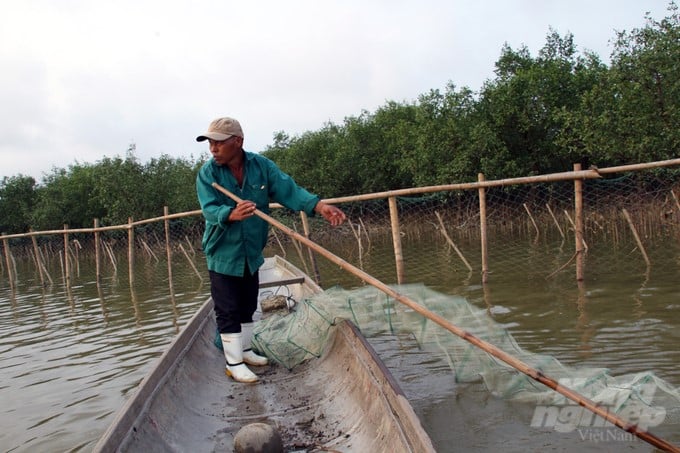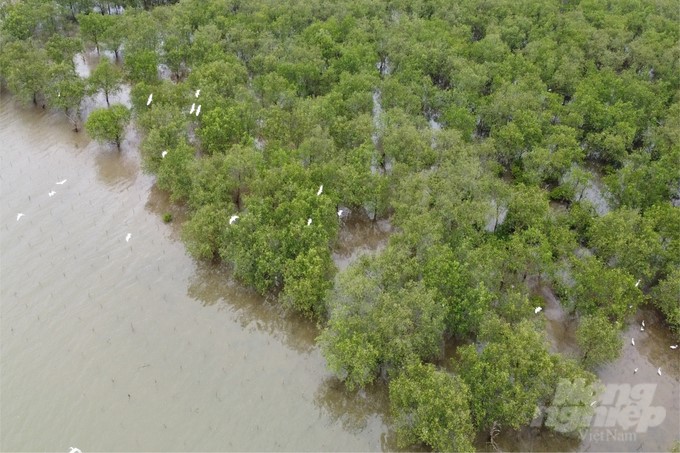May 19, 2025 | 19:21 GMT +7
May 19, 2025 | 19:21 GMT +7
Hotline: 0913.378.918
May 19, 2025 | 19:21 GMT +7
Hotline: 0913.378.918

Hundreds of households on Bac Phuoc Island attain sustainable livelihoods from mangroves. Photo: Vo Dung.
It was late in the afternoon, but the early summer sun was still harsh. Low tide is also the time when many people on Bac Phuoc Island go sailing along the edge of the forest to throw "lu" (a kind of tool used to catch seafood). More than 100 households engaged in fishing have sought their livelihood under Bac Phuoc Island’s mangrove canopy.
For many generations, Mr. Truong Quang Linh's family has lived on land and cultivated crops. But the family’s main income source depends on the water of Bac Phuoc Island, especially since the island is protected by the surrounding dyke line and mangrove apple forest.
Mr. Linh's boat crankily took us along the creek in the middle of the towering mangrove apple forest.
According to Mr. Truong Quang Linh, after many years of making a living and fishing in the estuary, his family’s livelihood and income remained unstable. His family therefore boldly bid for 22 ha of water surface in the lagoon area of Bac Phuoc Island's mangrove apple forest for fishing and aquaculture. His family can earn approximately VND 500,000 a day with only one or two main laborers going out to throw "lu" and catching all kinds of seafood.
In recent years, the catch has slightly decreased, but not so much that the people of Bac Phuoc Island have to overfish. Thanks to this positive action, the seafood resources here always ensure a fairly good income for the people despite being exploited every day.
"This area’s seafood is diverse. There are rabbitfish, mullet, shrimp, crab, and many more. Although the output has decreased compared to before, the seafood in the lagoon area is still of good quality, so it is frequently bought on the spot by traders at a high price. Thanks to that, the households receiving the water contract still secure their daily income," said Mr. Linh.
In addition to blocking waves, preventing landslides, and attracting aquatic species to live in the water area, Bac Phuoc mangrove apple forest is also a landing place for many wild birds, such as storks, bitterns, and gray herons. Every afternoon, this forest becomes the feeding and nesting place for flocks and flocks of birds of all species. Seeing many birds returning, many people from other localities came to hunt, but the people of Bac Phuoc Island tried to protect them regardless of day or night. "A bird would perch in a safe place", and so flocks of birds have been citizens of this land for decades.

Developing mangrove forest eco-tourism on Bac Phuoc Island will create conditions for people to change their lives. Photo: Vo Dung.
According to the statistics of the People's Committee of Trieu Phuoc commune, Bac Phuoc Island currently has more than 100 households engaged in fishing and aquaculture, and ten families have bid for lagoon areas of mangroves for farming. Many families raise shrimp and crabs and earn hundreds of millions of dongs each year. Now, the former poverty-stricken island has attained a new look, with spacious houses close together, concrete village roads. People's lives have been improved.
Mr. Tran Thien Nhan, Head of Trieu Phong Agriculture and Rural Development Department, said that the district currently has more than 60 ha of mangroves, mainly concentrated in Trieu Do and Trieu Phuoc communes.
In recent years the local people have put great efforts in protecting the mangrove apple forest. And thanks to the forest, many villages and crop areas have been protected from strong winds and waves. In mangrove areas, aquatic products are increasingly diverse and abundant, sustainably ensuring the living conditions of hundreds of households.
"Over the years, the strictly protected mangroves have promoted the important role of protection activities, minimizing the effects of climate change, building a stable coastal ecological environment, and contributing to the livelihoods of local people. Realizing the potential and advantages of mangrove forests, some localities have also boldly proposed to develop ecotourism, implement culinary services, and engage in experiential tourism activities to improve local people’s income. This is a good direction that helps to diversify livelihoods for people in mangrove areas," said Mr. Tran Thien Nhan, Head of Trieu Phong Department of Agriculture and Rural Development.
Translated by Huyen Vu

(VAN) 14 out of 35 domesticated elephants in Dak Lak province have had their living conditions improved, with 11 of them currently participating in the non-riding elephant tourism model.

(VAN) Muong Nhe Nature Reserve hopes that being upgraded to a national park will lay the foundation for forest protection efforts to be carried out in a systematic, modern, and sustainable manner.
/2025/05/16/3923-2-171845_52.jpg)
(VAN) Lower costs, higher yields, and improved soil quality are outstanding benefits that soybeans bring when integrated into the crop rotation system.

(VAN) The 'For a Green National Environment' programme aims to promote a green lifestyle, support businesses in implementing ESG practices, and turn Net Zero commitments into concrete actions.

(VAN) Cold-barn systems efficiently manage environmental and temperature conditions, which aids in the prevention of respiratory diseases in pigs and protects them from the vectors that transmit African swine fevers.

(VAN) To tackle challenges, the project 'Addressing key technical bottlenecks in the grouper supply chain in Vietnam' has been underway since 2024.

(VAN) The project 'Disease-Resilient and Sustainable Cassava Production Systems in the Mekong Region', funded by the Australian Center for International Agricultural Research (ACIAR), is being implemented from 2024 to 2028.